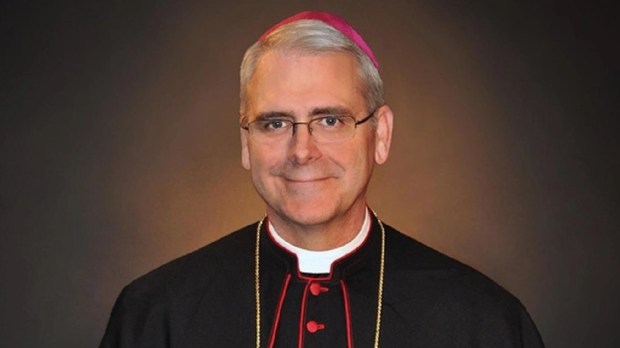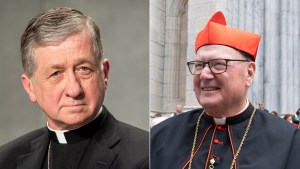In a recent pastoral letter, Bishop Paul Coakley of Oklahoma City addressed gender dysphoria and a range of topics surrounding it, and the transgender movement at large. The prelate gave a theological and scientific analysis of the trend, while offering empathy to those who struggle with gender dysphoria, affirming the love God has for all His children.
There was a lot to unpack in Archbishop Coakley’s 10-page letter, so let’s take a look at some of the most important and thought-expanding moments.
Theology
The archbishop opened with an explanation that we were created in God’s image for the purpose of love. A body and a soul are gifts from God, and the purpose behind the two sexes is to love and multiply. The human body is inherently good, which was emphasized when Jesus took our human flesh. He did not shed his humanity even after his resurrection.
“Pope Francis emphasized that the ‘biological sex and the socio-cultural role of sex (gender) can be distinguished but not separated.’ If gender is to serve the individual, it must neither be confined to rigid stereotypes nor untethered from the sex that grounds its meaning.”
Coakley next explains that humanity’s freedom has been distorted by sin since the Fall, with original sin in the Garden of Eden. Original sin can disconnect us from the ultimate Good in God, but we seek to fill this hole with other goods, and even identities, in order to find satisfaction, with “the desire for power, sex, alcohol, the internet and constant noise in a futile attempt to satisfy the aching in our soul.”
He empathizes with those who seek respite from the pain of not achieving this satisfaction by identifying as the opposite sex, or a “non-binary” variation, “because each of us in our own unique circumstances has sought to rest in something other than God.”
Archbishop Coakley noted that sin and injustices can obscure the recognition that the body is a gift, and these combine with our “fallen nature” to become factors that exacerbate “internal and external disharmonies” that can prevent the recognition of the inherent goodness of the body. This can result in a “discord in the unity of the body and soul,” which is often experienced by those who struggle with gender dysphoria. This, the prelate calls a “tremendous suffering,” for which he implores the faithful to “tread lightly and with great compassion” in the pursuit of truth in relation to such painful situations.
Statistics and well-being
In acknowledgement of this pain, Archbishop Coakley cites statistics related to those who identify as transgendered in the United States, of whom it is estimated 40% have attempted suicide at least once, a rate nine times higher than the general US population. Furthermore, nearly half (47%) of those who identify as transgendered reported having been sexually assaulted and more than half (54%) have been the subject of verbal harassment. This portion of the population is also at greater risk of developing many issues, including eating disorders, dissociative disorders, and substance abuse.
The archbishop instructed Catholics to be concerned for the welfare of transgendered people, along with condemning all forms of violence and unjust discrimination against them. He cited Christ’s direction to “love as we have been loved (John 13:34)” and reminds us that Christ died to redeem all of us.
“To love like Christ means to desire the good of the individuals in our lives and to walk with them, regardless of their degree of openness to the good.”
The Catholic response
With this laid out, Archbishop Coakley presents the authentic Catholic response to gender dysphoria, which he warns should avoid the extremes: That biological sex is the end of the conversation, or that the truth of the body should be ignored in favor of the false hope of relieving one’s pain through transition. Catholics, Archbishop Coakley challenges, must both affirm God-given sex, while recognizing the pain and struggles of the person in front of us. This requires us to listen from a place of empathy, as well as extending the invitation to receive God’s gift of the sexed body.
Furthermore, we must recognize that “all desires are rooted in something good,” even if those desires are misplaced:
“Ultimately, it means inviting the suffering person to surrender to the truth. Through their trust in Jesus Christ, they can receive assurance that despite the challenges and pain of bringing gender into alignment with one’s God-given sex, it will ultimately be for their happiness, holiness, and peace.”
To the transgendered
To those who are struggling, Archbishop Coakley reaffirmed that “God knows us and loves us – all of us.” He recognizes us all as his children and he sees our painful struggles, always offering us an invitation to follow him more deeply. While he admits that the path which the Church has laid out for transgendered people is “arduous and currently countercultural” he notes that it “also is a glorious, grace-filled, path on which Jesus offers ever deepening wholeness and holiness.”
Citing St. Paul’s writings in 1 Corinthians 12:26, “If one member suffers, all suffer together; if one member is honored, all rejoice together,” the archbishop made clear the Church’s desire to accompany transgendered people through their struggles, alongside Christ. He reiterated that transgendered people are a part of the Church, writing that “you belong here and, truly, you are welcome here.”
To parents
To parents of children who are grappling with gender dysphoria, Archbishop Coakley acknowledges the hardships of seeing a child in pain, and lamented that there is no quick fix that will satisfy all parties. Instead, parents must approach their children with “unconditional love, patience and humility,” offering to listen to their concerns with empathy. We must keep in mind that gender does not make up the whole of anyone’s life and that a perceived gender identity does not make them any less human, or our children.
He also warned parents against diving into “gender affirming therapy,” including puberty blockers and gender transitioning surgeries, which scientific research has shown to be less helpful options. The prelate cited data which has found that children who have undergone surgical options to treat gender dysphoria have “vastly higher rates of suicide and suicide attempts than their peers.” He also noted that puberty “blockers and opposite-sex hormones are experimental” with no current studies measuring the long term effects of such treatment on adolescent development.
He directed parents to Catholic counseling as a way to support their children through these times of struggle, for both the child and the parent. He warns that parents must avoid isolation and seek support from trusted friends or a parish priest. Most importantly, parents should ask the Lord to accompany them on this journey and to invite Jesus to touch the hearts of all involved parties through prayer and the Sacraments.
To all Catholics and people of good will, Archbishop Coakley called us to “bear witness to the truth inscribed in every human body,” and to do so with love. “Love requires that we offer the truth at a time and in the manner that is appropriate to the relationship so that the truth can be received.” Approaching the subject with “compassionate engagement” is a crucial aspect that we all must keep in mind if we have the opportunity to accompany someone struggling with gender dysphoria.
The transgender movement
Finally, Archbishop Coakley touched on transgenderism as a movement, which has become prevalent in culture and politics of late. While he decried the movement for attempting to promote and normalize transgenderism, he urged the faithful to distinguish the movement from the individuals who struggle with gender dysphoria. He wrote of the transgenderism movement:
“The transgender movement is rooted in a modern form of dualism where body and soul/mind/spirit are separate realities. In this view, the human person is the immaterial inhabitant of a physical host. The material body therefore can be manipulated in service to the immaterial soul/mind/spirit. Where the transgender movement sees a disconnect between the material and immaterial, Catholics see a beautiful unity as described earlier in this letter.”
Archbishop Coakley concluded by calling on the intercession of Mary, who “gave a full-hearted ‘yes’ to God in all things.” The Blessed Mother experienced the mysteries of Incarnation firsthand and accompanied her son, Jesus, all the way to the Cross, sharing in his pain. He encouraged all readers to pray Pope Francis’ prayer to Mary, Mother of the Church:
Mother, help our faith!
Open our ears to hear God’s word and to recognize his voice and call.
Awaken in us a desire to follow in his footsteps, to go forth from our own land and to receive his promise.
Help us to be touched by his love, that we may touch him in faith.
Help us to entrust ourselves fully to him and to believe in his love, especially at times of trial, beneath the shadow of the cross, when our faith is called to mature.
Sow in our faith the joy of the Risen One.
Remind us that those who believe are never alone.
Teach us to see all things with the eyes of Jesus, that he may be light for our path. And may this light of faith always increase in us, until the dawn of that undying day, which is Christ himself, your Son, our Lord!




